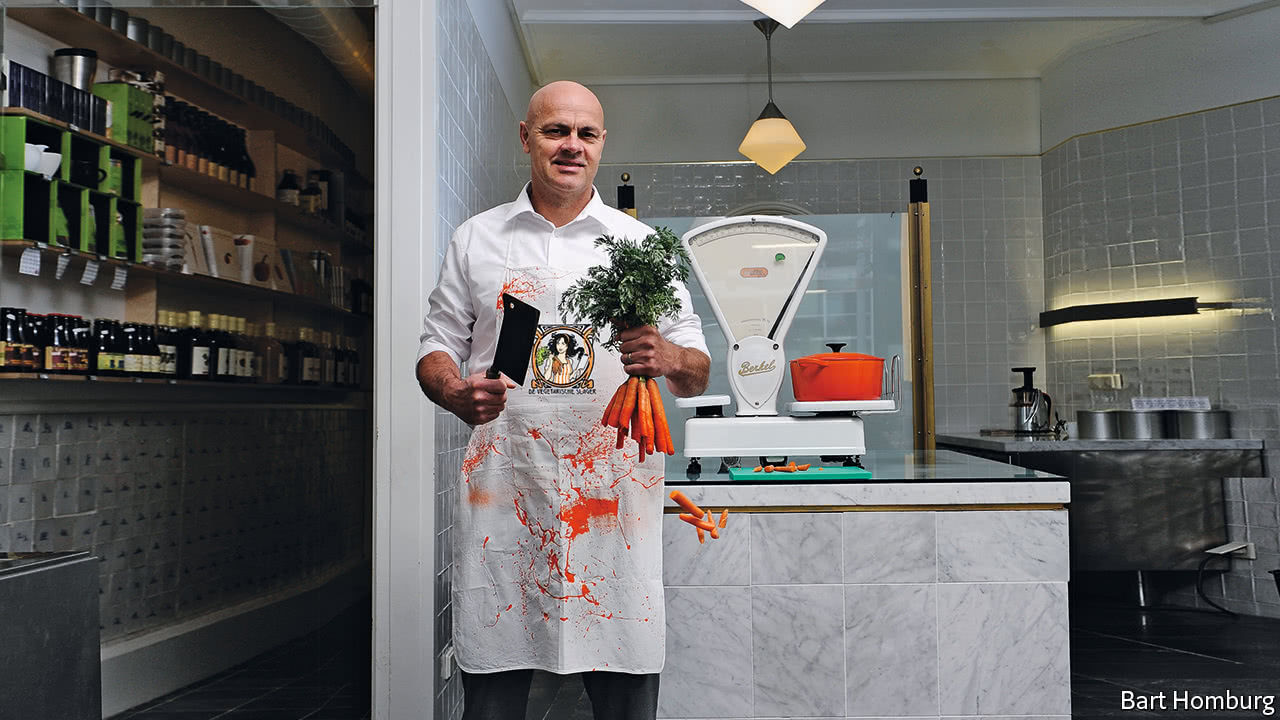
THE “kapsalon” is a healthy mix of chips, melted Gouda cheese, shawarma, lettuce and garlic sauce and is a tried and tested hangover cure in the Netherlands. So naturally, a butcher’s shop on the Spui, in The Hague, put it on its takeaway menu, alongside burgers and sausage rolls. As two young women walk out, tucking into their steaming kapsalons, an elderly gentleman asks how to prepare the steak he has just bought. The scene would have most carnivores fooled. For this butcher deals only in meatless “meat”.
“We want to become the biggest butcher in the world without ever slaughtering an animal,” says Jaap Korteweg, a ninth-generation farmer and founder of The Vegetarian Butcher. Since opening its first shop in The Hague in 2010 the company has been developing plant-based products that look, smell and taste like meat. “This shouldn’t just taste like real chorizo, it should leave the same red stains on your fingers,” says Maarten Kleizen, an employee, as he serves a slice.
-
The music industry should be dreaming of a white Christmas
-
Australia is to hold a royal commission into the finance industry
-
The smashers of Mary’s images are acting more against statues than against her
-
American Airlines risks 15,000 flight cancellations after a rostering mishap
-
How to spot the next crisis
-
Foreign reserves
The firm sells a variety of foods, ranging from minced meat to prawns, through 3,500 sales points in 15 countries (the bulk of them are in Dutch supermarkets) and has annual revenues of €12m ($14.2m). One in five sausage rolls sold in Albert Heijn, the Netherlands’ largest supermarket chain, comes from the veggie butcher. Mr Korteweg says he wants to make factory farming obsolete by “seducing meat-lovers” without inflicting suffering on animals and damage to the environment by feeding livestock.
Not everyone welcomes this vision. Earlier this year two Dutch politicians from the Liberal VVD party called for a ban on meat names for products that contained no animal protein. In October the country’s food authority asked The Vegetarian Butcher to rename misleading products, such as its “speck” (very similar to “spek”, the Dutch for bacon) because it might confuse consumers. The topic trended on Twitter for days; sales soared.
Dutch media termed the episode “Schnitzelgate” after a similar situation in Germany, whose minister for agriculture said that “meaty names” such as “schnitzel” and “wurst” should only be legal for animal-based products. That was seen as the meat lobby reacting to a country rapidly going veggie; a tenth of Germans are now vegetarians, up from 0.6% in 1983. In Brussels lobbyists want meat to get the same protection as milk did this summer (when the European Court of Justice ruled that soy-drink producers, for example, could not call their products milk). In October New Zealand’s Poultry Industry Association said packaging by Sunfed Meats, a meat-substitute firm, was misleading because its “chicken-free chicken” pictures a chicken and the phrase “wild meaty chunks”.
Mr Korteweg says that while his firm threatens chicken and pig farmers, meat companies and butchers are customers and partners. He co-operates with a Unilever sausage and soup brand, Unox; conventional butchers sell his products alongside animal-sourced meat. The arguments are likely to intensify as the market for alternative meat takes root.
Source: economist
Plant-based “meat” is so tasty that Europe’s meat industry has to bite back